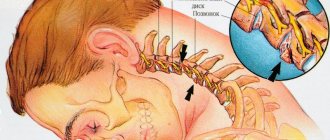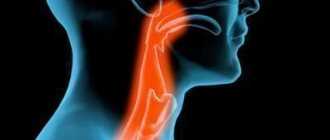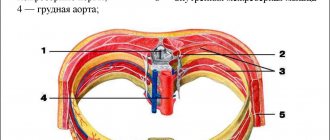Many health problems are related to nerves. They do not make themselves felt immediately, but develop gradually. And first of all, any stressful situations “hit” the organs of the gastrointestinal tract. Today we will talk about the causes of nervous gastritis and the symptoms of the disease. You will learn whether nerves can really cause stomach pain, and how to properly treat the disease.
Gastritis is one of the most common diseases, affecting 80% of the world's inhabitants. When a patient has a stomach ache due to nervousness, it is impossible to classify any specific disease. Therefore, doctors adhere to the term “gastric neurosis”. From the material you will learn about whether a diet is needed during an exacerbation of an ulcer or gastritis due to nervousness, whether it is worth using antibiotic therapy, how to improve the patient’s nervous condition in order to avoid relapse of the disease.
The relationship between gastritis and nerves
In a stressful situation, the nerves become overstrained and vulnerable. The deterioration of their condition causes spasm of the blood vessels, which causes slow blood supply to the mucous membranes. With insufficient supply of oxygen and other nutrients, the functioning of the gastrointestinal tract suffers.
Doctors believe that when a person is “under stress,” there is an increased production of hydrochloric acid, which leads to irritation of the walls of the stomach. In this case, the person may suffer from heartburn attacks and may experience stomach pain.
However, with poor nutrition, abuse of caffeine-containing and alcoholic beverages, damage to the mucous membrane occurs. In the future, gastric neuroses can lead to the development of a number of gastrointestinal diseases: gastritis, ulcers, gastroduodenitis.
Risk factors
Typically, the symptoms of gastritis arising “from nerves” are aggravated “thanks to”:
- frequent stress;
- depression;
- increased emotionality (when a person takes everything too to heart);
- excessive irritability.
Most often, people living in large cities suffer from gastritis that appears due to nervousness. The busy pace of life provokes nervousness and irritability. And due to the lack of physical activity, they get worse. Therefore, gastroenterologists and psychotherapists recommend taking time to rest, giving up smoking and alcohol, and not forgetting about sports.
Why, when you're worried, your stomach hurts and you want to go to the toilet?
Let's say you have an important meeting coming up, and it's not surprising that you feel nervous. And when you think about it, cramps begin in your intestines. You suddenly run to the toilet and wonder why you react this way. Why does this stomach reaction occur when we are nervous? What is actually happening in our body?
Bowel function and stress
Irritable bowel syndrome during a stressful situation is quite normal. The term “dyspepsia” is quite widespread. The disease is characterized by discomfort in the upper abdomen or abdominal pain, and these symptoms are very common under stress and nerves. An analysis of a number of studies indicates that approximately a quarter of people suffer from dyspepsia.
When we are nervous, several processes occur simultaneously in the brain that send a signal to the stomach and affect the digestion process. This response dates back to the days when humans were hunters and has become part of the fight-or-flight process - the physiological response to a harmful event, attack or threat to survival.
When we are relaxed, we have more energy for digestion. Faster processes in the intestines and stomach allow nutrients to be better absorbed. But during stress, processes in our small intestine slow down, and in the large intestine they speed up - this leads to discomfort in the abdominal area.
Experiments studying this phenomenon
In 1822, 19-year-old Alexis St. Martin was shot in the stomach. He survived, but suffered a hole in his stomach that could not heal for a very long time. Through this hole one could see the victim's stomach.
Even though Alexis was unwell, Army doctor William Bamont saw this as a unique opportunity. He used this wound as a window into the stomach to observe the process of digestion, conducting experiments to better understand the functioning of the intestines depending on the emotional state of a person.
For example, when Alexis was angry, Beaumont noticed that his digestion worsened.
Another study was conducted by Dr. Stuart Woolf on patient Tom Little. In 1894, when Tom was 9 years old, he drank something that severely damaged his esophagus. And he fed through a hole in his stomach.
As with Alexis, Dr. Wolf observed Tom's stomach during periods of emotional stress. He found that fear can turn the stomach white, and during periods of depression, digestion simply stops.
“Fight or flight”
In the early 20th century, scientist Walter Cannon coined the term "fight or flight" response after studying animals that were exposed to stress. He saw that when a cat was scared, the movements in its intestines (including the stomach and small intestine) slowed down significantly.
This process involves the work of two parts of the nervous system known as the sympathetic and parasympathetic. The sympathetic nervous system becomes active during times of stress and puts the body on alert. The parasympathetic nervous system, on the other hand, acts as a brake. All this activates a response that calms the body after stress, saving energy.
Effect of hormones
When we are under stress, the hypothalamus, the part of the brain responsible for regulating emotions, releases the hormone corticotropin, the main hormone that activates the sympathetic nervous system.
Corticotropin promotes the release of another hormone, adrenocorticotropic, which, in turn, releases cortisol from the adrenal glands. Cortisol is an important hormone for the fight-or-flight response. It helps us be ready to fight or flee and slows down the action in the gut.
This phenomenon is considered to be an evolutionary mechanism, since at this time there is an outflow of blood from the stomach and small intestine to the muscles and lungs, which allows our body to prepare for protection. When the parsympathetic nervous system is activated, the functioning of the stomach, small intestine and intestines is restored again.
But in the colon, things happen differently. During times of stress or nerves, movements in the colon, on the contrary, accelerate.
This reaction occurs under the influence of the parasympathetic nervous system, which turns on the rest mode, delivering signals to the colon.
During this time, the hormone corticotropin travels to the walls of the colon, where it stimulates receptors to produce fluid and also increases bowel movement.
In general, stress does not lead to bowel movements or diarrhea, since the process of bowel movement requires other complex functions. But in some stressful situations, the pelvic nerve can be activated and trigger the process of bowel movement.
Functional dyspepsia
We now understand which areas of the brain become active when we are under stress. This is done by examining parts of the brain. Neuromagnetic technology can measure changes in brain blood flow and correlate them to brain activity.
When you feel your stomach inflating like a balloon, parts of the brain such as the amygdala and insula, which are involved in processing emotions, become active. In people with functional dyspepsia, which is accompanied by symptoms such as pain, discomfort in the upper abdomen (without the presence of any illness), these parts of the brain may not be deactivated.
Research into functional dyspepsia points to how negative emotional memory can affect their brain activity.
When should you see a doctor?
If the symptoms become too severe or chronic, you should consult a doctor to be examined and, if necessary, receive treatment. If endoscopy does not reveal any abnormalities, then most likely you have functional dyspepsia. In such cases, patients may benefit from cognitive behavioral therapy.
Found a violation? Report content
Source: https://FB.ru/post/mental-health/2018/12/4/38341
Symptoms of nervous gastritis
Gastritis is the “culprit” of many diseases (including stomach and duodenal ulcers, as well as cancerous tumors).
Of course, gastritis develops not only against the background of a stressful situation. The rate of development of the disease depends on a number of factors: poor nutrition, the presence of Helicobacter pylori infection, taking certain medications, and the presence of bad habits.
Reflex gastritis, which occurs due to nervous conditions, deserves special attention. It develops against the background of other diseases and is associated with a malfunction in the neuro-reflex regulation of the gastrointestinal tract.
Signs of illness
- Stomach pain due to nervousness. In this case, the pain is localized in the upper third of the abdomen.
- Belching causes bad breath. Heartburn may occur.
- After eating, there is heaviness in the stomach. The same sensations arise in the late evenings.
- Particles of mucus or blood may be found in the stool.
- Nausea and vomiting also sometimes occur.
- Nervous gastritis and ulcers may be accompanied by rapid heartbeat.
Also, symptoms of gastritis caused by nervousness include such signs as constant drowsiness, rapid fatigue of the body, pain in the heart, low blood pressure.
One of the latest studies proves that people who are regularly exposed to stress are 3 times more likely to suffer from gastritis. Gastric and duodenal ulcers are no exception.
Sources
- Meenakshi Rao, Michael D. Gershon. The bowel and beyond: the enteric nervous system in neurological disorders. Nat. Rev. Gastroenterol. Hepatol. 2020, Sep: 13(9):517-528. URL: https://www.ncbi.nlm.nih.gov/pmc/articles/PMC5005185/
- Joel C. Bornstein, Serotonin in the Gut: What Does It Do? Front Neurosci. 2012; 6: 16. URL: https://www.ncbi.nlm.nih.gov/pmc/articles/PMC3272651/
- Chris Mavrangelos, Melissa A. Campaniello, Jane M. Andrews, Peter A. Bampton, Patrick A. Hughes. Longitudinal analysis indicates symptom severity influences immune profile in irritable bowel syndrome. Gut. 2020. URL: https://www.sciencedaily.com/releases/2017/06/170620122901.htm
- Brian E. Lacy, Nihal K. Patel. Rome Criteria and a Diagnostic Approach to Irritable Bowel Syndrome. J. Clin. Med. 2020 Nov. 6(11): 99. URL: https://www.ncbi.nlm.nih.gov/pmc/articles/PMC5704116/
- Wathsala S. Nanayakkara et al. Efficacy of the low FODMAP diet for treating irritable bowel syndrome: the evidence to date. Clin. Exp. Gastroenterol. 2016; 9: 131–142. URL: https://www.ncbi.nlm.nih.gov/pmc/articles/PMC4918736/
- Instructions for medical use of the drug Duspatalin® (Mebeverine) 135 mg, film-coated tablets dated May 24, 2017
- Ivashkin V.T., Maev I.V., Baranskaya E.K. et al. Recommendations of the Russian Gastroenterological Association for the diagnosis and treatment of cholelithiasis RZHGGK 2016; 3:64-80 2.
- NICE. Clinical Practice Guideline. Irritable bowel syndrome in adults: Diagnosis and management of irritable bowel syndrome in primary care. February 2008. Updated March 2020. Available at: https://www.nice.org.uk/guidance/cg61/evidence/full-guidance-pdf-196701661 (accessed 09.21.18)
- Minushkin O.N., Elizavetina G.A., Ardatskaya M.D. Drug therapy for functional disorders of the intestines and biliary system, occurring predominantly with abdominal pain and flatulence. Clinical pharmacology and therapy. 2002;1:24-26.
- International foundation for gastrointestinal disorders. Statistics. 10 May 2016 https://www.aboutibs.org/facts-about-ibs/statistics.html
More: https://www.aboutibs.org/facts-about-ibs/statistics.html https://www.medicalnewstoday.com/articles/37063.php https://www.emedicinehealth.com/irritablebowelsyndrome/articleem htm#howdoyouknowifyouhaveibs-tests https://www.news-medical.net/health/Irritable-Bowel-Syndrome-(IBS)-and-Stress-Response.aspx https://s3.gi.org/patients/cgp/ pdf/ibs.pdf https://www.sciencedaily.com/releases/2017/06/170620122901.htm https://www.scientificamerican.com/article/gut-second-brain/
What to do next: diagnosis of the disease
First, you need to undergo an examination and diagnosis. When examining a patient, the doctor takes into account such important characteristics as elevated body temperature, tension in the stomach muscles, and even the type of vomit. After collecting an anamnesis, the patient must undergo a series of examinations that will help identify exacerbation of gastrointestinal diseases.
The most popular diagnostic method is gastroscopy. However, in some cases additional tests may be needed: biopsy, biochemical blood test, ultrasound, Helicobacter pylori test, x-ray.
If you have been diagnosed with an exacerbation of gastritis due to nervousness, then you also need to seek the advice of a psychotherapist. A competent specialist will help you establish the cause that provoked stress and further exacerbation of the gastrointestinal tract disease.
Antibiotic therapy
In some cases, nervous gastritis can be aggravated due to the bacterium Helicobacter pylori. In this case, it is recommended to treat with antibiotics. Typically therapy lasts 7-14 days. Remember that it is also recommended to take other medications that eliminate the main symptoms of the disease.
Remember that treatment with such drugs must be under medical supervision. After antibiotic therapy, you will need to be tested again and take a breath test for Helicobacter.
Treatment with drugs to relieve symptoms
If a person gets gastritis due to a nervous breakdown, then it is necessary to take antacid medications. Their action is aimed at relieving pain and getting rid of heartburn. Drugs such as Maalox, Gaviscon and Almagel protect the gastric mucosa from the destructive effects of bile and hydrochloric acid. For increased acidity, antisecretory medications are also prescribed.
During the treatment of gastritis, which developed due to stress, it is necessary to observe bed rest.
How to keep stress under control
It is quite common for people to experience stomach pain or diarrhea when they are nervous. However, this condition is not always associated with serious stressful situations. Even minor everyday problems or work issues can throw your gastrointestinal tract out of balance.
Since this psychosomatic illness is easier to prevent than to treat, we recommend that you listen to the advice of specialists.
- Try to spend at least an hour a day outdoors.
- Regular exercise is recommended. Swimming has a particularly beneficial effect on the functioning of the central nervous system.
- If you are often irritable and take everything too personally, you should try yoga and meditation.
When your stomach hurts due to nervousness, you should not lift weights. It is also recommended to avoid strenuous physical training. Remember that if you have a sick stomach, it is not recommended to perform various types of abdominal crunches.
Treatment
Stomach pain caused by stress is treated with the same method as stress.
- A sick person needs rest and bed rest.
- He is put on a strict diet, at least for the first few days. You might even go hungry. Hunger allows the stomach to rest, relieves irritation and inflammation.
- You can do meditation. Later - physical exercises.
- It is important to eliminate the very cause of pain - the current psychological situation.
- Folk remedies help: decoctions of chamomile, meadowsweet, yarrow, caraway, flaxseed.
- It’s a good idea to visit a psychologist who can help you deal with your current problems.
- Some people recommend doing yoga.
It must be remembered that the true cause of stomach pain can only be determined by a qualified medical specialist. Sometimes stomach pain can provoke completely different diseases. Self-medication in any case can cause serious harm to your health.
What should be the diet for nervous gastritis?
If you are prone to exacerbation of gastritis that occurs due to nervousness, it is very important to adhere to a balanced diet.
- You should avoid seasonings that irritate the stomach lining. Also, avoid eating too hot food. And, of course, any gastritis or nervous ulcer is not compatible with eating smoked, fried and fatty foods.
- Eating flaxseed porridge will be of great benefit for gastritis and peptic ulcers. It envelops the walls of the stomach and protects them from the aggressive effects of hydrochloric acid, has a laxative effect and improves the functioning of the gastrointestinal tract.
- Experts strongly advise avoiding products with all kinds of industrial additives. Keep an eye on the expiration date when purchasing items in the store. Remember that intoxication caused by poisoning can have a detrimental effect on the condition of the gastrointestinal tract over time.
- Try to chew your food thoroughly. The fact is that with the development of nervous gastritis, the functioning of the stomach is disrupted. It is also important to monitor the condition of your teeth. If necessary, contact your dentist.
- Only low-calorie foods are allowed. Give preference to lean varieties of fish and meat.
- It is very important to stick to fractional meals. You need to eat 4-5 times a day, keeping an interval of 3-4 hours between meals.
- It is not recommended to eat later than 3-4 hours before bedtime. However, after six in the evening, your diet should consist of easily digestible foods (for example, non-starchy vegetables). Because in the evening the production of hydrochloric acid increases.
If gastritis worsens due to nerves, you should stop eating for at least 24 hours. It is allowed to drink only still water and herbal infusions.
Remember that if the above symptoms occur, you must immediately contact a specialist who can diagnose the cause of the disease. After all, a patient’s stomach pain is not always caused by nerves. Sometimes similar symptoms may indicate a disease of other internal organs.









